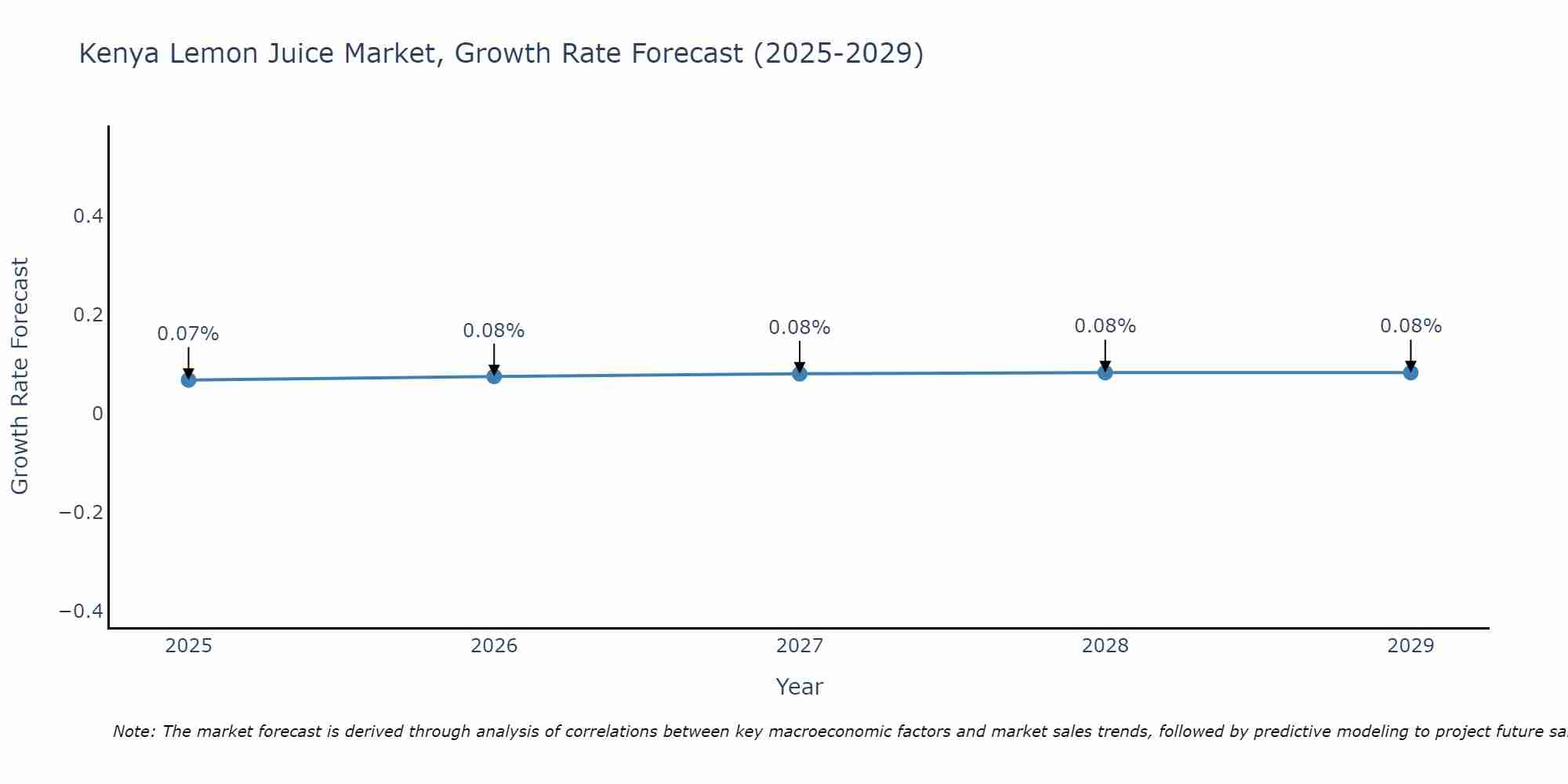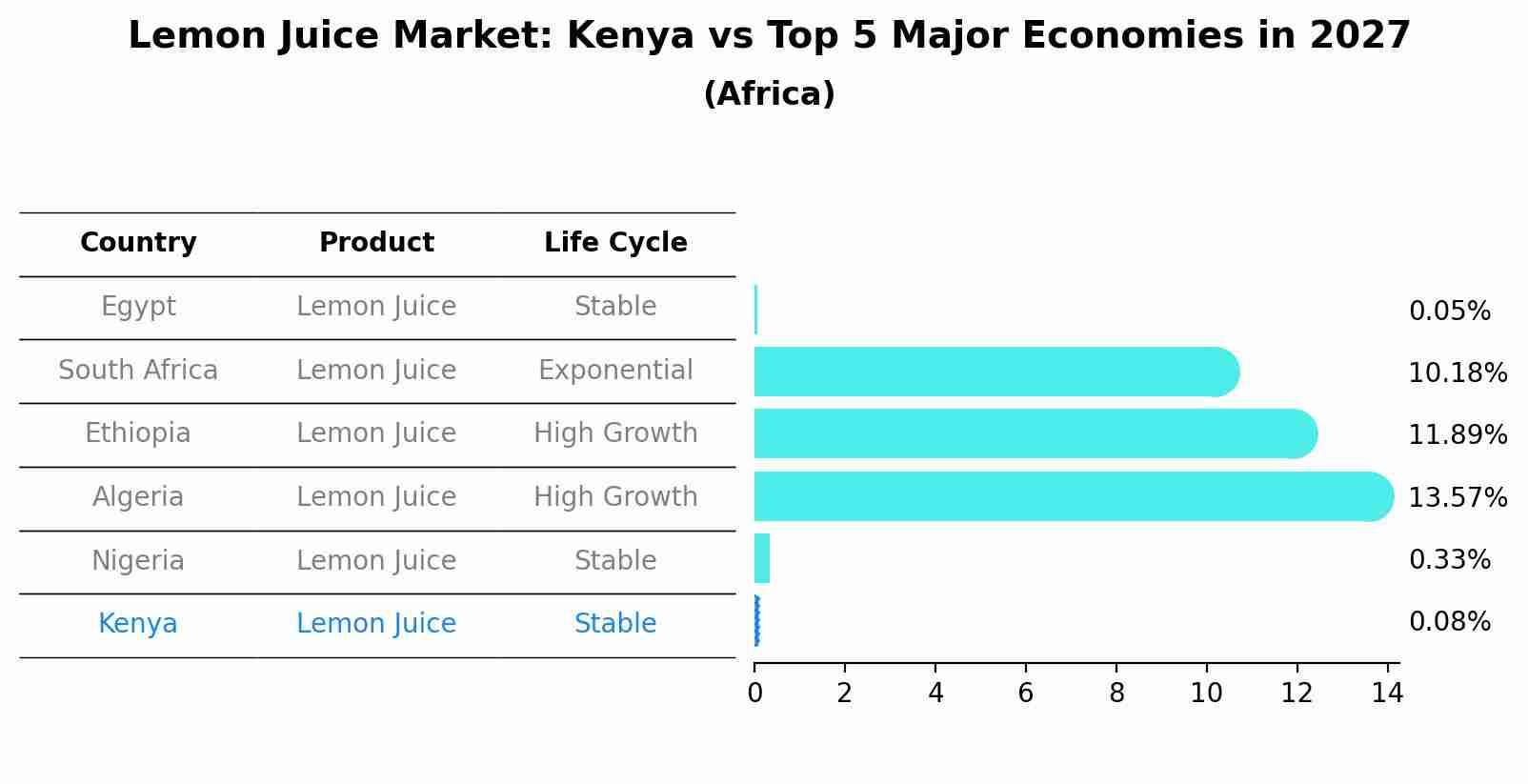Kenya Lemon Juice Market Outlook | Forecast, Companies, Analysis, COVID-19 IMPACT, Size, Share, Trends, Industry, Value, Revenue & Growth
| Product Code: ETC083949 | Publication Date: Jun 2021 | Updated Date: Jun 2025 | Product Type: Report | |
| Publisher: 6Wresearch | Author: Sachin Kumar Rai | No. of Pages: 70 | No. of Figures: 35 | No. of Tables: 5 |
Kenya Lemon Juice Market Size Growth Rate
The Kenya Lemon Juice Market is poised for steady growth rate improvements from 2025 to 2029. The growth rate starts at 0.07% in 2025 and reaches 0.08% by 2029.

Lemon Juice Market: Kenya vs Top 5 Major Economies in 2027 (Africa)
The Lemon Juice market in Kenya is projected to grow at a stable growth rate of 0.08% by 2027, within the Africa region led by Egypt, along with other countries like South Africa, Ethiopia, Algeria and Nigeria, collectively shaping a dynamic and evolving market environment driven by innovation and increasing adoption of emerging technologies.

Kenya Lemon Juice Market Overview
The Kenya lemon juice market is experiencing steady growth driven by increasing consumer awareness of the health benefits associated with lemon juice consumption, such as its high vitamin C content and antioxidant properties. The market is characterized by a growing demand for natural and healthy beverages, leading to a rise in the popularity of lemon juice as a refreshing and nutritious drink choice. Key players in the market are focusing on product innovation, such as introducing organic and cold-pressed lemon juices, to cater to the evolving consumer preferences for clean-label and premium products. Additionally, the market is witnessing a surge in online retail channels for lemon juice products, providing consumers with convenient access to a wide range of options. Overall, the Kenya lemon juice market is poised for further expansion as health-conscious consumer trends continue to drive demand for natural and functional beverages.
Kenya Lemon Juice Market Trends
The Kenya Lemon Juice Market is experiencing a growing trend towards healthier beverage options, with an increasing consumer preference for natural and organic products. This shift towards healthier lifestyles has led to a rising demand for lemon juice as a refreshing and nutritious drink choice. Additionally, the popularity of lemon-based detox drinks and cocktails has contributed to the market growth. Manufacturers are focusing on introducing new and innovative lemon juice products, such as cold-pressed and ready-to-drink options, to cater to the evolving consumer preferences. With a rising awareness of the health benefits of lemon juice, including its high vitamin C content and antioxidant properties, the market is expected to continue expanding in the coming years.
Kenya Lemon Juice Market Challenges
In the Kenya Lemon Juice Market, some of the challenges faced include seasonality of lemon production leading to fluctuating supply, inconsistent quality of lemons which affects the taste and consistency of the juice, limited access to modern processing technology resulting in lower productivity and higher costs, and competition from other beverages in the market. Additionally, issues such as lack of awareness about the health benefits of lemon juice, inadequate distribution channels in certain regions, and price fluctuations due to external factors like weather conditions and global market trends also impact the growth and sustainability of the lemon juice market in Kenya. To overcome these challenges, stakeholders in the industry need to focus on improving quality control measures, investing in better processing technology, expanding distribution networks, and increasing consumer education and awareness initiatives.
Kenya Lemon Juice Market Investment Opportunities
In the Kenya Lemon Juice Market, there are several investment opportunities for both local and international investors. One promising avenue is the production and distribution of premium quality, ready-to-drink lemon juice products targeting health-conscious consumers. Investing in modern processing facilities and implementing efficient supply chain management can help capitalize on the growing demand for natural and healthy beverages in the market. Additionally, there is potential for partnerships with local farmers to ensure a stable supply of fresh lemons for production. Developing innovative packaging and marketing strategies to differentiate products in a competitive market can also be a key driver for success. Overall, investing in the Kenya Lemon Juice Market presents opportunities for growth and profitability in a market that is increasingly embracing healthy lifestyle choices.
Kenya Lemon Juice Market Government Policy
The Kenyan government has implemented various policies related to the lemon juice market to promote growth and ensure quality standards. These include regulations on food safety and hygiene, particularly in the production and processing of lemons and lemon juice. Additionally, the government has provided support for small-scale lemon farmers through initiatives such as capacity-building programs and access to financing. Importantly, the government has also focused on promoting exports of Kenyan lemon juice by establishing trade agreements and participating in international food exhibitions. Overall, these policies aim to drive competitiveness, improve quality, and increase market access for Kenyan lemon juice producers both domestically and internationally.
Kenya Lemon Juice Market Future Outlook
The Kenya Lemon Juice Market is projected to experience steady growth in the coming years due to increasing consumer awareness of the health benefits associated with lemon juice consumption. Factors such as rising disposable incomes, changing dietary preferences towards healthier options, and growing demand for natural and organic beverages are expected to drive market growth. Additionally, the popularity of lemon-based drinks in the foodservice sector and the rise of juicing trends among health-conscious consumers are likely to further boost market expansion. The introduction of innovative lemon juice products, convenient packaging options, and marketing strategies focusing on the nutritional value of lemon juice are anticipated to contribute to the market`s positive outlook in Kenya.
Key Highlights of the Report:
- Kenya Lemon Juice Market Outlook
- Market Size of Kenya Lemon Juice Market, 2021
- Forecast of Kenya Lemon Juice Market, 2027
- Historical Data and Forecast of Kenya Lemon Juice Revenues & Volume for the Period 2018 - 2027
- Kenya Lemon Juice Market Trend Evolution
- Kenya Lemon Juice Market Drivers and Challenges
- Kenya Lemon Juice Price Trends
- Kenya Lemon Juice Porter's Five Forces
- Kenya Lemon Juice Industry Life Cycle
- Historical Data and Forecast of Kenya Lemon Juice Market Revenues & Volume By Type for the Period 2018 - 2027
- Historical Data and Forecast of Kenya Lemon Juice Market Revenues & Volume By With Sugar for the Period 2018 - 2027
- Historical Data and Forecast of Kenya Lemon Juice Market Revenues & Volume By Without Sugar for the Period 2018 - 2027
- Historical Data and Forecast of Kenya Lemon Juice Market Revenues & Volume By Application for the Period 2018 - 2027
- Historical Data and Forecast of Kenya Lemon Juice Market Revenues & Volume By Online for the Period 2018 - 2027
- Historical Data and Forecast of Kenya Lemon Juice Market Revenues & Volume By Offline for the Period 2018 - 2027
- Kenya Lemon Juice Import Export Trade Statistics
- Market Opportunity Assessment By Type
- Market Opportunity Assessment By Application
- Kenya Lemon Juice Top Companies Market Share
- Kenya Lemon Juice Competitive Benchmarking By Technical and Operational Parameters
- Kenya Lemon Juice Company Profiles
- Kenya Lemon Juice Key Strategic Recommendations
Frequently Asked Questions About the Market Study (FAQs):
1 Executive Summary |
2 Introduction |
2.1 Key Highlights of the Report |
2.2 Report Description |
2.3 Market Scope & Segmentation |
2.4 Research Methodology |
2.5 Assumptions |
3 Kenya Lemon Juice Market Overview |
3.1 Kenya Country Macro Economic Indicators |
3.2 Kenya Lemon Juice Market Revenues & Volume, 2021 & 2027F |
3.3 Kenya Lemon Juice Market - Industry Life Cycle |
3.4 Kenya Lemon Juice Market - Porter's Five Forces |
3.5 Kenya Lemon Juice Market Revenues & Volume Share, By Type, 2021 & 2027F |
3.6 Kenya Lemon Juice Market Revenues & Volume Share, By Application, 2021 & 2027F |
4 Kenya Lemon Juice Market Dynamics |
4.1 Impact Analysis |
4.2 Market Drivers |
4.3 Market Restraints |
5 Kenya Lemon Juice Market Trends |
6 Kenya Lemon Juice Market, By Types |
6.1 Kenya Lemon Juice Market, By Type |
6.1.1 Overview and Analysis |
6.1.2 Kenya Lemon Juice Market Revenues & Volume, By Type, 2018 - 2027F |
6.1.3 Kenya Lemon Juice Market Revenues & Volume, By With Sugar, 2018 - 2027F |
6.1.4 Kenya Lemon Juice Market Revenues & Volume, By Without Sugar, 2018 - 2027F |
6.2 Kenya Lemon Juice Market, By Application |
6.2.1 Overview and Analysis |
6.2.2 Kenya Lemon Juice Market Revenues & Volume, By Online, 2018 - 2027F |
6.2.3 Kenya Lemon Juice Market Revenues & Volume, By Offline, 2018 - 2027F |
7 Kenya Lemon Juice Market Import-Export Trade Statistics |
7.1 Kenya Lemon Juice Market Export to Major Countries |
7.2 Kenya Lemon Juice Market Imports from Major Countries |
8 Kenya Lemon Juice Market Key Performance Indicators |
9 Kenya Lemon Juice Market - Opportunity Assessment |
9.1 Kenya Lemon Juice Market Opportunity Assessment, By Type, 2021 & 2027F |
9.2 Kenya Lemon Juice Market Opportunity Assessment, By Application, 2021 & 2027F |
10 Kenya Lemon Juice Market - Competitive Landscape |
10.1 Kenya Lemon Juice Market Revenue Share, By Companies, 2021 |
10.2 Kenya Lemon Juice Market Competitive Benchmarking, By Operating and Technical Parameters |
11 Company Profiles |
12 Recommendations |
13 Disclaimer |
- Single User License$ 1,995
- Department License$ 2,400
- Site License$ 3,120
- Global License$ 3,795
Search
Thought Leadership and Analyst Meet
Our Clients
Related Reports
- Canada Oil and Gas Market (2026-2032) | Share, Segmentation, Value, Industry, Trends, Forecast, Analysis, Size & Revenue, Growth, Competitive Landscape, Outlook, Companies
- Germany Breakfast Food Market (2026-2032) | Industry, Share, Growth, Size, Companies, Value, Analysis, Revenue, Trends, Forecast & Outlook
- Australia Briquette Market (2025-2031) | Growth, Size, Revenue, Forecast, Analysis, Trends, Value, Share, Industry & Companies
- Vietnam System Integrator Market (2025-2031) | Size, Companies, Analysis, Industry, Value, Forecast, Growth, Trends, Revenue & Share
- ASEAN and Thailand Brain Health Supplements Market (2025-2031) | Strategy, Consumer Insights, Analysis, Investment Trends, Opportunities, Growth, Size, Share, Industry, Revenue, Segments, Value, Segmentation, Supply, Forecast, Restraints, Outlook, Competition, Drivers, Trends, Demand, Pricing Analysis, Competitive, Strategic Insights, Companies, Challenges
- ASEAN Bearings Market (2025-2031) | Strategy, Consumer Insights, Analysis, Investment Trends, Opportunities, Growth, Size, Share, Industry, Revenue, Segments, Value, Segmentation, Supply, Forecast, Restraints, Outlook, Competition, Drivers, Trends, Demand, Pricing Analysis, Competitive, Strategic Insights, Companies, Challenges
- Europe Flooring Market (2025-2031) | Outlook, Share, Industry, Trends, Forecast, Companies, Revenue, Size, Analysis, Growth & Value
- Saudi Arabia Manlift Market (2025-2031) | Outlook, Size, Growth, Trends, Companies, Industry, Revenue, Value, Share, Forecast & Analysis
- Uganda Excavator, Crane, and Wheel Loaders Market (2025-2031) | Strategy, Consumer Insights, Analysis, Investment Trends, Opportunities, Growth, Size, Share, Industry, Revenue, Segments, Value, Segmentation, Supply, Forecast, Restraints, Outlook, Competition, Drivers, Trends, Demand, Pricing Analysis, Competitive, Strategic Insights, Companies, Challenges
- Rwanda Excavator, Crane, and Wheel Loaders Market (2025-2031) | Strategy, Consumer Insights, Analysis, Investment Trends, Opportunities, Growth, Size, Share, Industry, Revenue, Segments, Value, Segmentation, Supply, Forecast, Restraints, Outlook, Competition, Drivers, Trends, Demand, Pricing Analysis, Competitive, Strategic Insights, Companies, Challenges
Industry Events and Analyst Meet
Whitepaper
- Middle East & Africa Commercial Security Market Click here to view more.
- Middle East & Africa Fire Safety Systems & Equipment Market Click here to view more.
- GCC Drone Market Click here to view more.
- Middle East Lighting Fixture Market Click here to view more.
- GCC Physical & Perimeter Security Market Click here to view more.
6WResearch In News
- Doha a strategic location for EV manufacturing hub: IPA Qatar
- Demand for luxury TVs surging in the GCC, says Samsung
- Empowering Growth: The Thriving Journey of Bangladesh’s Cable Industry
- Demand for luxury TVs surging in the GCC, says Samsung
- Video call with a traditional healer? Once unthinkable, it’s now common in South Africa
- Intelligent Buildings To Smooth GCC’s Path To Net Zero


















